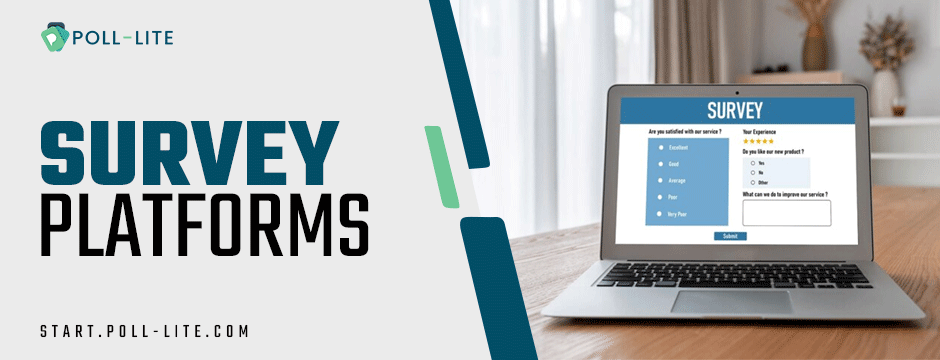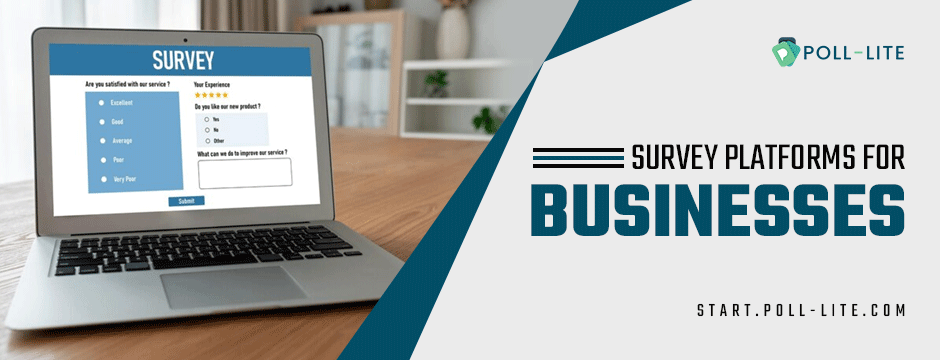In today’s data-driven world, understanding customer feedback and employee sentiment is more important than ever. Survey platforms offer businesses a convenient and efficient way to gather valuable insights. However, choosing the right survey platform can take time and effort, given the many options available. This guide will help you navigate the selection process, ensuring you choose a survey platform that best fits your business needs. We will also explore various use cases and industry examples to understand what to look for comprehensively.
Understanding Your Business Requirements
Clearly defining your business requirements is crucial before diving into the features and capabilities of different survey platforms. Consider the following questions:
1. What is the primary purpose of your surveys?
- Are you looking to gather customer feedback, conduct market research, measure employee satisfaction, or something else?
2. Who is your target audience?
- Are your surveys intended for customers, employees, partners, or the general public?
3. What type of data do you need to collect?
- Are you collecting quantitative data (e.g., ratings and multiple-choice answers) or qualitative data (e.g., open-ended responses)?
4. What is your budget?
- Survey platforms range from free to premium, with varying features and limitations.
Key Features to Look For
Once you have a clear understanding of your business requirements, you can start evaluating survey platforms based on the following key features:

1. Ease of Use
The survey platform should have an intuitive interface that allows you to create and distribute surveys quickly and easily. Look for platforms with drag-and-drop survey builders, pre-designed templates, and customizable question types.
2. Customization Options
Branding is essential for maintaining a consistent image. Ensure the survey platform allows you to customize the survey’s look and feel to match your brand, including logos, colors, and fonts.
3. Question Types and Logic
A good survey platform should offer a variety of question types, such as multiple-choice, Likert scales, open-ended questions, and more. Advanced logic features like skip logic, branching, and piping can also help create a more personalized and relevant survey experience.
4. Distribution and Accessibility
Consider how you will distribute your surveys. The platform should support multiple distribution channels, including email, social media, web links, and SMS. Ensure the surveys are mobile-friendly and accessible to respondents with disabilities.
5. Reporting and Analytics
Effective survey platforms for businesses provide robust reporting and analytics capabilities. Look for features such as real-time response tracking, data visualization, cross-tabulation, and exporting data to other tools like Excel or Google Sheets.
6. Integration Capabilities
Your survey platform should integrate seamlessly with other tools and systems you use, such as CRM software, marketing automation platforms, and data analysis tools. This integration can streamline your workflow and provide more comprehensive insights.
7. Security and Compliance
Data security is paramount, especially if you are collecting sensitive information. Ensure the survey platform complies with data protection regulations like GDPR and CCPA. Look for data encryption, secure data storage, and user authentication features.
Use Cases and Industry Examples
To illustrate how different survey platforms for businesses can meet specific needs, let’s explore a few industry examples:

1. Customer Feedback in Retail
Retail businesses seeking customer feedback on their shopping experience can benefit from a survey platform that offers customizable templates and easy distribution methods. For instance, Poll Lite allows retailers to create visually appealing surveys that can be distributed via email or at the point of sale. With real-time reporting, businesses can quickly identify areas for improvement and enhance the customer experience.
2. Employee Satisfaction in Healthcare
Healthcare organizations often need to measure employee satisfaction to improve working conditions and reduce turnover. A survey platform with advanced logic features, like skip logic and branching, can help create tailored surveys that address specific departments and roles. Poll Lite’s integration with HR systems ensures seamless data collection and analysis, providing actionable insights for HR managers.
3. Market Research in Technology
Technology companies frequently conduct market research to stay ahead of industry trends and understand customer needs. A survey platform with robust reporting and analytics capabilities is essential for analyzing large datasets. Poll Lite offers powerful data visualization tools and the ability to export data to analysis software, making it an ideal choice for tech firms conducting in-depth market research.
4. Event Feedback in Education
Educational institutions hosting events or webinars must collect participant feedback to improve future offerings. A survey platform that supports multiple distribution channels, including social media and SMS, ensures maximum reach. Poll Lite’s mobile-friendly surveys make it easy for participants to provide feedback on the go, helping educators gather valuable insights quickly.
Making the Final Decision
It’s time to decide after evaluating various survey platforms based on your business requirements and the key features discussed. Here are a few additional tips to help you choose the right platform:
1. Trial Periods and Demos
- Take advantage of free trials and demos offered by survey platforms. This hands-on experience can help you better understand the platform’s capabilities and usability.
2. Customer Support
- Assess the level of customer support provided by the survey platform. Responsive and knowledgeable support can be crucial when encountering issues or needing assistance.
3. User Reviews and Testimonials
- Read user reviews and testimonials to gauge the experiences of other businesses. Look for feedback on ease of use, reliability, and customer support.
4. Scalability
- Consider the scalability of the survey platform. Ensure it can accommodate your future needs as your business grows and your survey requirements evolve.
Conclusion
Choosing the right survey platform for your business needs is a critical decision that can significantly impact your gathering of valuable insights. You can make an informed choice by understanding your business requirements, evaluating key features, and considering industry-specific use cases. With its user-friendly interface, robust customization options, and powerful analytics, Poll Lite is an excellent option for businesses looking to enhance their survey capabilities. Remember to take advantage of trial periods and seek platforms offering strong customer support to ensure a smooth and successful survey experience.

